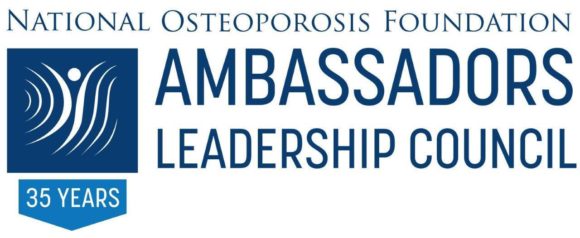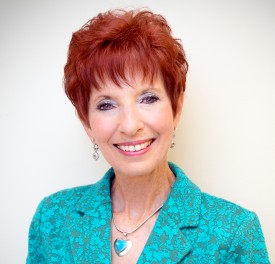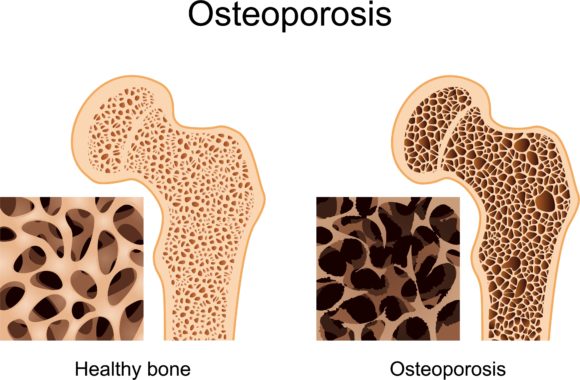 In the U.S., more than 54 million people either already have osteoporosis or are at high risk of the disease due to low bone density. Osteoporosis-related bone fractures are responsible for more hospitalizations than heart attacks, strokes and breast cancer combined.
In the U.S., more than 54 million people either already have osteoporosis or are at high risk of the disease due to low bone density. Osteoporosis-related bone fractures are responsible for more hospitalizations than heart attacks, strokes and breast cancer combined.
A recent study released by the National Osteoporosis Foundation (NOF) found that these high-risk patients remain untreated despite knowing of their increased fracture risk, having concerns that a fracture could severely limit quality of life, and being aware of their treatment options. An Ambassadors Leadership Council, comprised of individuals in most of the 50 states in the U.S. who serve as advocates for those who suffer from osteoporosis, helps to advise the leadership of NOF.

Kathleen Morgan, professor in the Department of Family and Community Health Sciences at Rutgers.
Kathleen Morgan, professor in the Department of Family and Community Health Sciences at Rutgers, is one of several ambassadors in New Jersey who serve on the leadership council.
“It has been my pleasure to serve as a NOF Ambassador. An ambassador is a well-informed, passionate, and an often persuasive individual who cares deeply about those who suffer from osteoporosis. In my immediate family, five family members have experienced the effects of osteoporosis. Both of our parents had osteoporosis, and my two sisters and I have osteoporosis. You can see why as an Ambassador and a caring family member, being a strong advocate for osteoporosis prevention, treatment and management is of utmost importance,” said Morgan.
On October 20, Morgan and other NOF ambassadors join with patients and groups around the globe urging people to learn the risk factors and take appropriate action to protect their bone health as part of World Osteoporosis Day.
“We know that many people have questions about bone health so we’ve created a suite of resources, “35 Ways to Stay Bone Strong,” said Elizabeth Thompson, CEO of NOF. “We invite you to become an advocate, empower yourself and your friends by knowing the facts, and find ways to maintain a healthy lifestyle.”
Ambassadors are adept at making an impact and sparking positive change in their field, sector or community, as Morgan can attest.
“It has been my goal to reach as many individuals with osteoporosis education as I can in our state. Too many individuals do not get properly screened for osteoporosis. It is important to teach them to advocate for themselves and their bones.”
 Bone health risk factors are both controllable and uncontrollable. Areas within your control include screening for osteoporosis with a bone mineral density test (also called a DXA scan), consuming adequate calcium and Vitamin D in your diet, eating enough fruits and vegetables, getting appropriate exercise and avoiding smoking. Uncontrollable factors are age (over 50), menopause, a family history of osteoporosis, and low body weight/being small and thin.
Bone health risk factors are both controllable and uncontrollable. Areas within your control include screening for osteoporosis with a bone mineral density test (also called a DXA scan), consuming adequate calcium and Vitamin D in your diet, eating enough fruits and vegetables, getting appropriate exercise and avoiding smoking. Uncontrollable factors are age (over 50), menopause, a family history of osteoporosis, and low body weight/being small and thin.
Morgan advocates talking with your healthcare provider to understand your unique risks and plan to stay bone strong. NOF’s website offers important information and resources about risks related to osteoporosis, fractures and treatment. Visit www.nof.org for these resources and more.
About the National Osteoporosis Foundation
Established in 1984, the National Osteoporosis Foundation is the nation’s leading health organization dedicated to preventing osteoporosis and broken bones, promoting strong bones for life and reducing human suffering through programs of awareness, education, advocacy and research. For more information on the National Osteoporosis Foundation, visit www.nof.org.
About World Osteoporosis Day
Through early prevention, diagnosis and treatment of osteoporosis, millions of men and women all over the world can reduce their risk of painful, debilitating and life-threatening fractures. We invite the public, healthcare professionals and organizations worldwide to join its 240-member societies in raising awareness of bone health and calling for action on osteoporosis prevention in their communities. Learn more at http://worldosteoporosisday.org.

